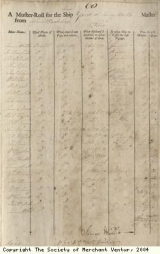The personal account of a sailor
Joseph Banfield was a sailor. He made several slaving voyages on different ships, including the Gambia, owned by John Fowler & Co of Bristol. He wrote his personal account of his adventures. Many sailors could not read or write, so their personal accounts are rare. Banfield could write, although his English was not very good.
The ship Banfield was in, the Gambia, was anchored off the shore of West Africa. The sailors had to row to shore in small rowing boats to trade. After an accident in one of the ship’s rowing boats, Banfield was stranded on the coast and was looked after by Africans. He got back safely to his ship and completed his voyage. Banfield sailed again on the Gambia to Africa in 1771. On the voyage across the Atlantic Ocean to the port of Charleston in North America, they had very bad weather. Banfield writes that because of the bad weather, the crew could not get below decks to feed the enslaved Africans. Through disease or starvation, 20 died and the remainder were in a very poor condition when the ship arrived in America. Thus the 133 surviving slaves sold for a low price. This is an interesting, if brief, first-hand account of how the weather could affect a voyage and the fate of the enslaved Africans. Joseph Banfield wrote:
‘In 1769 I shipped myself [as] Chief Mate with Captain Williss in the snow Gambia to got to Gambia River on the Coast of Africa. I continued with him: the first voyage that I was with him, I was lost away in the longboat, about 50 leagues from the vessel on 15 May 1770, I was oversett by a tornado, I had with me one white man and one black man. The former perished and the latter was saved and my self by the help of one oar, one mile or more from whence we were overset, we knew not whence to go, for nothing but the wild wilderness was exposed to our view, where the wild beasts is innumerable. And of the other extremities likewise, not even one Rag left to cover our nakedness with us.
In this dismal condition was we. We had moved some miles toward the wood, whence we knew not, lamenting our circumstances, Providence guided us so well that have us in the way of two Black men armed with bows and arrows.
When, as soon as they saw us advancing towards them, they stood their ground, and put themselves in a posture of defence to defend themselves, supposing me to be some wild creature that they might have never saw. But this idea soon forsook them for I sent my black companion to speak to them, while I stood at a distance, he then acquainted them of our sad accident, they then instantly disarmed themselvs and really participated in our sorrows and directed us which way to go and we should come to a town.
Which we accomplished jest as the sun was setting, when we was received by our host, which was the master of the town. He then ordered up some milk which I drank, for I stood much in need of some nourishment. My Black companion being then part away from me whither I could not tell. The old man my host observing my conditions ordered me a cloth for to cover my nakedness with which I readily accepted of. And some boiled rice with some more milk, which I ate with a good appetite.
Here I was kept fourteen days with this old man. The fourteenth day there was news come to the town, that there was a vessel come to the trading post belonging to that town, which was about 3 or 4 miles from the principle town, the name of the place so called Barring. The Governor’s wife of the Fort James in Gambia River, being on board this ship atrading for the Governor, heard I was there. She instantly came to relieve me and demand me off the old man, which he denied without one slave in my place. She then told him if he would not let me go without a slave in my place, she would return down to the fort and bring up a company of soldiers and destroy his town for them. Sooner than say no to the fury of the woman, he consented to let me go away with her, for which I must be forever beholden to this good woman, for I trust so to call her.
So we got our release, me and my black companion, and after about twenty days I got safe to my vessel again. We soon sailed, after I got back, for Barbados where we arrived in about 25 days. We sold our Negroes to some Gentlemen to carry them over to the Dutch Main. We then, after repairing the vessel, sailed for Bristol, when we arrived in the month of October 1770.
We stayed at home about four months and then fitted out again for Gambia and with the same comander sailed to Africa and thence to Charlestown. In the month of September from the 19th until the 23rd we was in a continual gale.
We was obliged to batten down our gratings fore and aft for the whole time of the gale. It cut our boat to pieces on the deck, and heave her overboard. At this time we could not give any subsistence to the slaves, so that during the gale we lost 20 or so of the slaves that was situated below, and the remainder much impaired, so that we came to a very bad market.’



